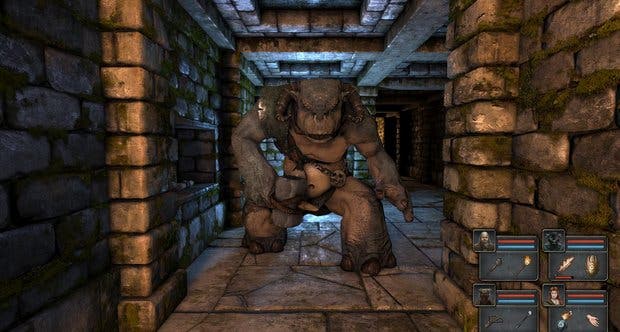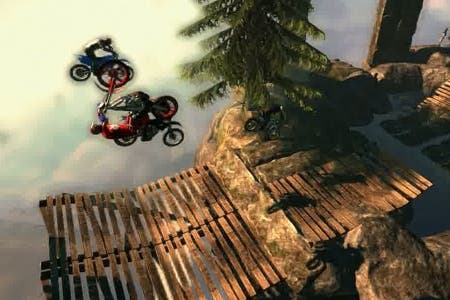Game of the Week: Trials Evolution
Motocross my heart.
You can't really say that the games industry has downtime any more, but there are a few months of the year - months like this one - when the high-profile boxed releases dry up and the traditional publishers and distributors take a breather before winding up for a crack at the next financial quarter. We used to call these spells "droughts", but frankly, the modern games industry makes a mockery of that term.
Look at the astonishing last two weeks, which have casually served up a fistful of game-of-the-year contenders: a magical indie adventure; a lavish sequel to a modern arcade classic; the return of a much-loved multiplayer warhorse in a startling new form; a console re-version of a PC epic that defies technical belief; and an unashamed throwback to a forgotten sub-genre that so captured players' imagination that it stormed the sales charts. What's more, all but one of these games was made by independent developers (and the one exception can make a decent claim to retaining an indie spirit).
You didn't even need to cast your net a lot further than that to find the likes of Skullgirls (a tournament-level fighting game by a US indie - what?), the marvellous Floating Cloud God Saves the Pilgrims (a unique and beautiful shooter on the forgotten PlayStation Minis platform) or Botanicula, another charming point-and-click adventure by those Czech masters of surrealism, Amanita Design (look out for a review next week).
Drought? Don't make me laugh. Good show, modern games industry.
I've written enough about that magical adventure Fez already, but I can't let this week go by without mentioning two more of last week's games which we got to a little late. PC role-player Legend of Grimrock by Finnish indie Almost Human proves that everything old is new again by returning to a 25-year-old template for dungeon-crawling so simple and cruel, it's entirely refreshing.

"Legend of Grimrock walks a very fine tightrope with outrageous confidence," wrote Dan in our Legend of Grimrock review. "With its ruthless adherence to 1990s design it shamelessly panders to nostalgia, but it never feels like it relies on that inherited fondness to get by... It reminds us that the old ways still have value, but its thoughtful construction and nuanced balance ensure that it can still stand on its own two feet in 2012 and justify its existence on its own terms."
Meanwhile, Rich Stanton was blown away by Tribes Ascend, a bold reimagining of the cult jetpack-powered shooter from a most unlikely source. Hi-Rez Studios started life as a vanity project for an Atlanta businessman Erez Goren. His vision of a massively multiplayer sci-fi shooter, 2010's Global Agenda, didn't quite take flight, but it left him with exactly the talent he needed to really do Tribes justice, and the hard-won experience to know how to sell a multiplayer PC game in 2012 (don't, give it away for free).
"Hi-Rez has taken the fundamentals of Tribes and polished them until they shine, but this is no mere rehash," said Rich. "The class designs change Capture the Flag utterly, transforming it into a masterpiece of high-speed tactical manoeuvring that has a niche for every kind of play-style. Tribes Ascend only really does one thing, but does it pretty much perfectly."
You want another unlikely story? How about the Polish studio formed from something as unglamorous as a distribution company, which bought the rights to a locally popular series of fantasy novels and turned them into two globally successful PC games, all while taking a vigorous stance against the creeping constraints of digital rights management? And then, for good measure, brought its latest technical beast to Xbox 360 with improved graphical effects and a solid frame rate?
They said it couldn't be done. "The level of technical accomplishment we see here is more in line with what we'd expect from a top-tier first-party studio designing a game directly for the strengths of the host console hardware," wrote a stunned Rich Leadbetter in Digital Foundry's tech analysis of The Witcher 2. "Compare and contrast with a comparable technology - such as Anvil, the Assassin's Creed engine, which has gradually evolved across four games thus far. On its first attempt, CD Projekt RED has bested it in virtually every way, from characters to environment detail to lighting to effects work - and it runs more smoothly to boot.
"Combine what is a landmark technological achievement with an intriguing story, enormous amounts of depth and a fun combat system and we have the complete package."
Will wonders never cease?
Trials Evolution
In a way, they will, because the story of our game of the week is a much more predictable tale. Small studio makes hugely successful game, sells out to big publisher, makes bigger, better, shinier sequel with more features. It sells so well it breaks Microsoft's servers and everyone showers in money.
Trials Evolution's success isn't any more of a shock than its excellence. But it's still amazing to think how far this motorcycle stunt racer has come from its roots as a Flash game - and also how far it hasn't. The developers at RedLynx and their new paymasters at Ubisoft deserve credit for not trying to force Trials into a shape that doesn't suit it, for never straying from the tenets of its faith for one second: four control inputs, fun physics, leaderboards. It's that simple.
"As we reflect on the success of digital games like Fez and Bastion, which point the way to a brave new future without discs and boxes, it's easy to forget that the idea behind Xbox Live Arcade was originally rooted in the past," noted Tom in our Trials Evolution review. "It came from the days of upright cabinets like Ms Pac-Man - games that were best played alone, but with friends, who would compete to displace each other's initials at the top of a rudimentary leaderboard. [Trials has] this concept at its core."
He concluded: "Trials Evolution... offers simple, one-player gameplay that uses leaderboards to provoke excitement and competition among strangers, and in this sense it has a lot in common with the original Xbox Live Arcade games. The way that it makes its challenging content accessible to a majority of players, however, is what singles it out as one of the best."
This April is certainly (and thankfully) better-endowed with great games than so many of those that preceded it, and many of them are the unlikeliest of success stories delivered in a manner that was almost unimaginable a decade ago. But while it's tempting to say that normal rules no longer apply and nothing you know is true, Trials Evolution's evocation of arcade spirit - and Grimrock's reactionary design, and Tribes' revivalism, and The Witcher 2's custom-fitted approach to technology - also prove a much more dependable aphorism: good ideas never go out of fashion.









